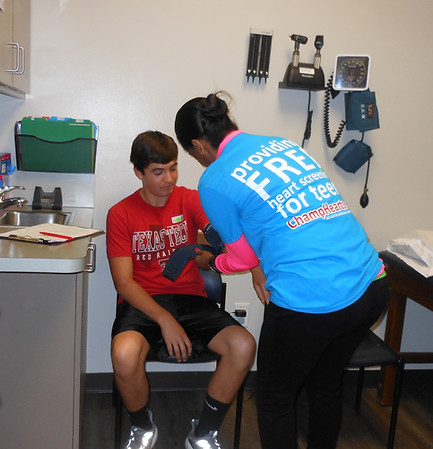
HEART
SCREENINGS
Championship Hearts’ free student heart screenings are open to all athletes, band members, spirit groups and students ages 14 – 18 in Texas. Our purpose is to prevent deaths from Hypertrophic Cardiomyopathy, also known as HCM. Hypertrophic Cardiomyopathy is a serious heart condition that is the leading cause of sudden cardiac death in young athletes. Rarely having any identifiable symptoms, HCM affects approximately 1 in 500 student athletes. Championship Hearts Foundation has conducted almost 30,000 free student heart screenings since its' founding.

Screening Process
For each student, we collect height and weight measurements, test blood pressure, perform a 12-lead electrocardiogram (ECG) and perform a limited echocardiogram (ECHO).
Electrocardiogram (ECG)
An ECG records the electrical signals of the heart, and is used to detect rhythm disorders.
Echocardiogram (ECHO)
The limited ECHO uses sound waves to capture images of the heart structure. These detailed pictures are helpful for detecting heart abnormalities of heart wall thickness, and congenital heart valve defects.
The Traditional Heart Screening Process: What To Expect
research analysis
Texas Adolescent Athlete Heart Screening Registry™
Championship Hearts Foundation offers free heart screenings for students (ages 14-18) in an effort to help prevent sudden cardiac death (SCD) from Hypertrophic Cardiomyopathy (HCM) as a part of our commitment to serving the preventive health needs of our community. Many abnormalities of the heart can potentially cause SCD. HCM is probably the most common cause and may often be detected by echocardiogram (2-D echo) and/or electrocardiogram (EKG). Other significant heart abnormalities that may cause SCD may also be detected using 2-D echo and EKG. However, screening does not always detect an abnormality even when it is actually present and not all potentially fatal heart abnormalities can be detected by this screening.
Championship Hearts Foundation believes the results of these heart screenings should be monitored in a registry entitled Texas Adolescent Athlete Heart Screening Registry™ (TAAHSR™). All data collected for TAAHSR™ will be de-identified to reduce the risk of loss of confidentiality and will be included only with your permission. Data to be collected include: brief medical/family history; ethnicity; sex; sports of participation; height/weight; results of 2-D echo and EKG; and results of any potential follow up care.
Such data will possibly benefits others with abnormal heart conditions in the future. Initial analysis of early data collected by Championship Hearts has resulted in the following scientific journal publications. Click below for links to the original abstracts.
Cardiac Safety Research Consortium
Joining eleven other community screening organizations from across the country, Championship Hearts Foundation is a part of a national pilot study to establish a national cardiac screening data warehouse. The pilot study is under the direction of The Cardiac Safety Research Consortium (CSRC), and led by the project's principal investigator, Salim F. Idriss, MD, PhD, executive co-director of the Duke Pediatric and Congenital Heart Center and director of pediatric electrophysiology at Duke University Medical Center. The project receives oversight from the Duke University Institutional Review Board. Read the latest news...
Browse Our Scientific Publications
J Am Coll Cardiology 2013; 61(suppl A), A398 (Abstract).
Echocardiographic left ventricular measures using the area-length method: Normative data by gender and race/ethnicity from the Texas Adolescent Athlete Heart Screening Registry (TAAHSR).
AHA poster presentation 2013.
Left ventricular dimensions derived by echocardiography correlate with body mass index in a large population of multiethnic athletes screened in the Texas Adolescent Athlete Heart Screening Registry (TAAHSR).
J Am Coll Cardiology 2012; (Suppl).
AEDS

Automated external defibrillators (AEDs)
Automated external defibrillators (AEDs) have saved countless lives. Basically, the way an automated external defibrillator works is that during cardiac arrest it evaluates a person’s heartbeat and, if needed, shocks the heart to reestablish a normal heartbeat. Cardiac arrest typically happens when the heartbeat is abnormal or too fast, thus keeping the heart from working the way it’s supposed to, and with each moment that this is happening comes the possibility of permanent brain damage or even death.
Some people keep automated external defibrillators on hand at home, and it’s also common to see them in public places like schools and malls. Though many first aid and CPR courses include learning to use automated external defibrillators, the device is made to operate simply so that most anyone can use it to save another person’s life. Of course, if you ever use an automated external defibrillator, it’s recommended to first call 911 so that paramedics will arrive as quickly as possible.
Be Prepared to Use Automated External Defibrillators
It’s a good idea to be prepared to use automated external defibrillators, especially if you live with someone who is at risk for cardiac arrest or has a history of heart problems. Though automated external defibrillators have instructions, reading and following them on-the-spot doesn’t compare to having prior training and experience. Check in your local newspaper for CPR, First Aid, and automated external defibrillator training classes. Even if you do not live with someone who is at risk of having a heart attack, you never know when the valuable knowledge of how to use automated external defibrillators may save a life.
Championship Hearts’ education and awareness campaign shows Texans that AEDs are safe, easy to use, and save lives. So many people are afraid to use automated external defibrillators, but Championship Hearts aims to encourage people to use them by witnessing AED demonstrations in their community or trying it themselves at a training course or at a community gathering.
BRING A SCREENING TO YOUR COMMUNITY
We are happy to partner with you in bringing a Young Athlete Heart Screening to your community! Please call us or submit the inquiry form below. Thank you!


